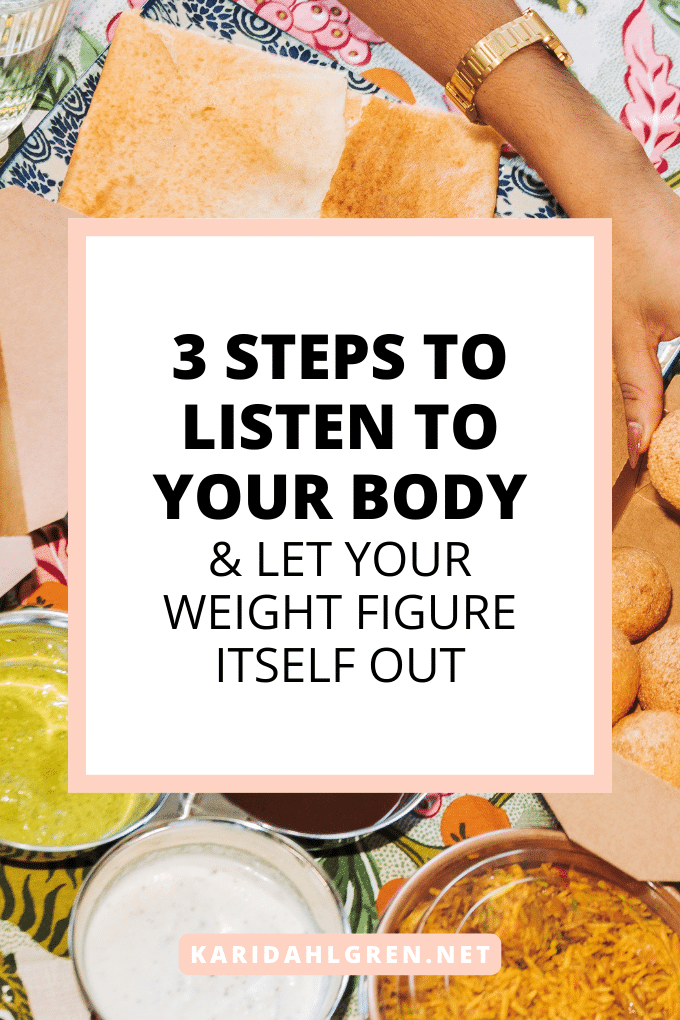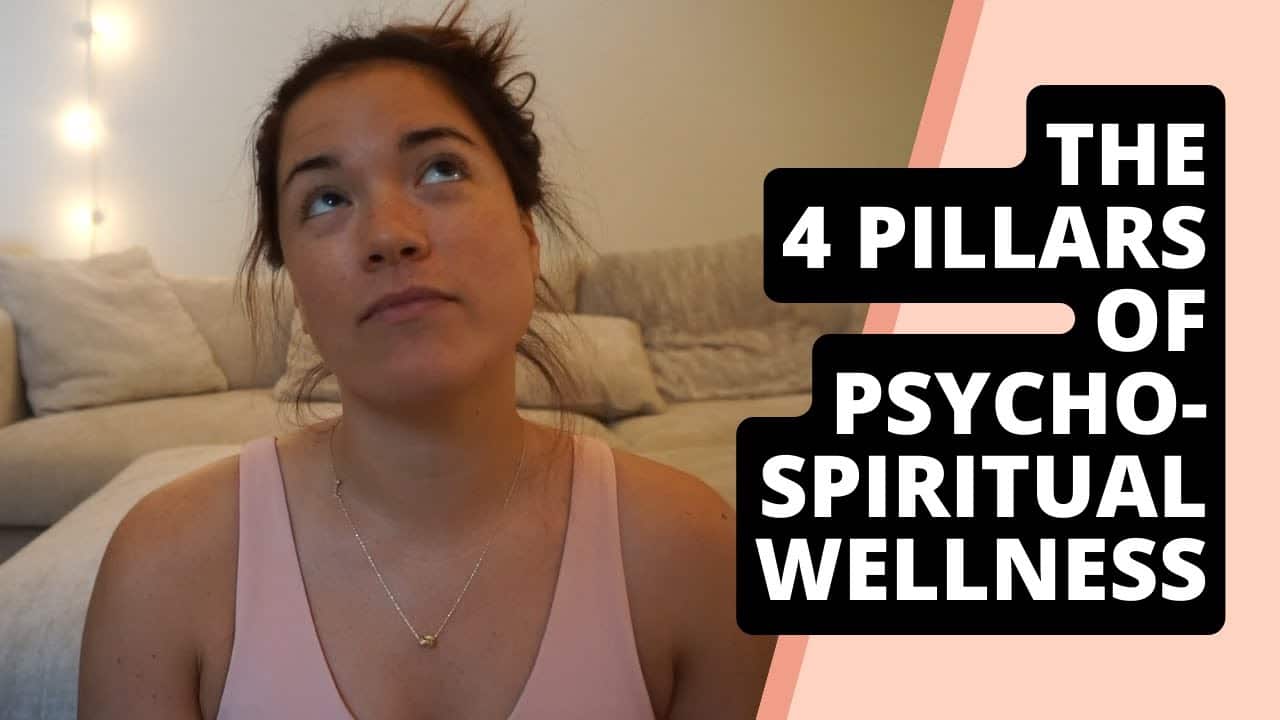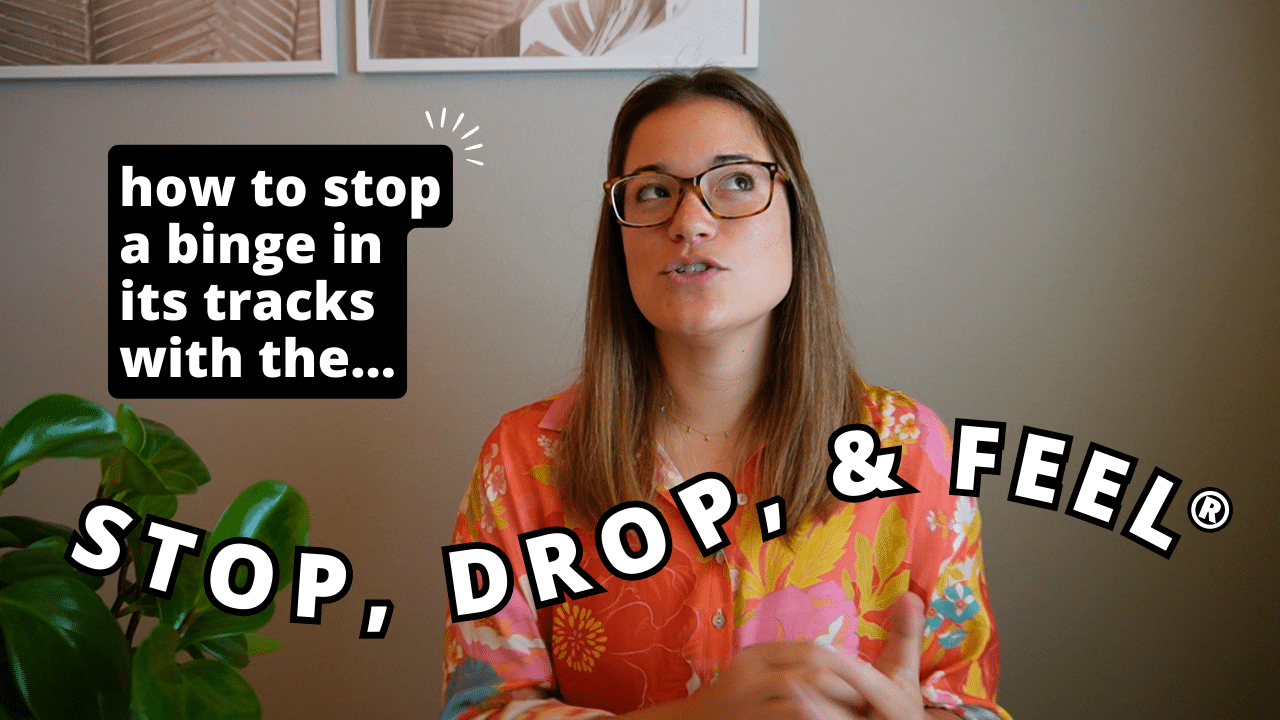
“Eat exactly what appeals to you when you’re hungry, stop when you’re full, and you’re guaranteed not to have any weight problems.” I read this in a magazine ad eons ago—a magazine shockingly embedded with diet culture—and because it was so opposite to dieting, it left a lasting impression on me.
Little did I know at the time, but relearning how to listen to your body would become part of the psycho-spiritual formula for healing my relationship with food. (I wish I could remember who sponsored that ad. I believe it was something related to intuitive eating, though intuitive eating stands against weight loss for reasons I partially agree but mostly disagree with.)
The ability to listen to your body is a skill that is tarnished by diet culture and erased by the practice of dieting—of listening to external cues instead of internal cues. Relearning how to listen to your body is integral in learning how to stop dieting and “eat normally”—aka, in sync with your body again.
As infants, we cry when we’re hungry and stop when we’re full. We are intimately tuned into our bodies’ signals, and we even know to refuse food without hunger. This innate ability to regulate food intake based on internal and intuitive signals is natural and effective. You can get back there again.
Relearning how to listen to your body is an essential and sequential step to healing your relationship with food. It is not the only step for “eating normally” and stopping overeating, but it’s one very important step of many.
Relearning How to Listen to Your Body

My approach to stopping compulsive eating is called Psycho-Spiritual Wellness, and it’s rooted in eating psychology and spirituality—not dieting. The four pillars of my approach include: feeling your feelings, giving up dieting, addressing any limiting beliefs around food and body image, and eating enough food. Aside from addressing your beliefs, the rest of my approach truly focuses on relearning how to listen to your body.
Taking the words from that life-changing ad, let’s talk about how to get back in touch with your body’s signals by eating exactly what appeals to you when you’re hungry, stopping when you’re full, and letting your weight figure itself out.
Step 1: Eat Exactly What Appeals to You When You’re Hungry
Embarking on the journey of relearning how to listen to your body is both empowering and, admittedly, a bit daunting. The idea of eating exactly what appeals to you when you’re hungry can feel like stepping into uncharted territory potentially riddled with weight gain.
Decades of dieting and adherence to strict food rules can create a deep-seated fear: the fear that without these rules, our eating will spiral out of control. It’s common to worry about weight gain with intuitive eating, but it’s also a crucial barrier to break down on the path to a healthier relationship with food.
Clinical studies shed light on a counterintuitive truth: the very food rules we cling to for control are often the triggers for overeating.[1] When we label foods as ‘good’ or ‘bad’ and deny ourselves the foods we crave, it can lead to a cycle of restriction and bingeing.[2]
In contrast, when we allow ourselves to eat what genuinely appeals to us, we begin to break this cycle. Breaking free from dieting means breaking up with food labels and viewing all foods neutrally.
Instead of viewing a donut as “bad” and then feeling guilty for eating it, try to view it neutrally. This negates the guilt and also negates the “rebelliousness” we feel towards foods that are labelled as bad, which helps us stop craving them as much.[3]
It Takes Time for Hunger to Reemerge After Years of Dieting
After years, or even decades, of ignoring your body’s natural hunger cues in favor of external diet rules, these internal signals can become muted. It’s like relearning a language you were once fluent in but haven’t spoken in years. Initially, it may be challenging to recognize or trust your body’s hunger signals.
This is where patience and self-kindness become vital. It’s okay if you don’t always get it right. It’s okay if you can’t always tell whether you’re hungry or not. When you’re unsure, try to do the kind thing, which includes eating enough.
Try not to let the desire to lose weight push you to skip a meal just because you’re not physically hungry. Going too long without eating is not treating your body with kindness and often leads to extreme hunger later, which can trigger overeating.[4]
While you’re healing your metabolism after dieting, try to listen to your hunger and when you can’t hear it, make sure you’re eating enough food. For now, the goal is not to lose weight. The goal is to rebuild trust with your body and let your weight figure itself out as a natural byproduct of your intuition.
Step 2: Stop When You’re Full
Learning how to stop eating when you’re full is arguably the hardest step, especially for those struggling with compulsive eating. Fortunately, you’re in the right place, because I used to struggle with this step very much, and I was able to break through with my Stop, Drop, & Feel method.

In a nutshell, the Stop, Drop, & Feel asks you to stop yourself before you reach for food without hunger, drop into your body, and ask yourself how you’re feeling. Again, though, the ‘stop’ is arguably the hardest part, and this is where the element of permission comes into play.
The Stop, Drop, & Feel always starts with a promise that you can eat exactly what you want after the SDF is over. This promise prevents the SDF from becoming another layer of restriction. It honors the element of permission to eat and helps prevent the SDF from triggering the restrict-binge cycle.
Also, the ‘feeling’ step can also be quite difficult, and it’s important to distinguish between “feeling your feelings” and self-care. Writing in a journal or even talking to a therapist are great forms of self-care (and I highly encourage them!) but they are not “pure” forms of feeling your feelings because they still create a small buffer between you and your emotions.
The goal of the Stop, Drop, & Feel is to sit completely still with your emotions for two minutes with zero distractions. It will feel like the longest two minutes of your life—because the emotions that drive us to eat when we aren’t hungry are the edgiest ones—and that’s how you know you’re onto something big.
Step 3: Let Your Weight Figure Itself Out
The concept of letting your weight figure itself out can be both liberating and intimidating, especially in a culture fixated on controlling body size. However, by tuning in to your body’s signals, you allow it to naturally find its set point weight where it feels best.
The concept of letting go of restrictive diets and trusting your body’s signals is both freeing and, admittedly, a bit daunting in a culture deeply invested in controlling body size. However, clinical studies have repeatedly shown that restrictive dieting can paradoxically lead to a higher set point weight, as the body reacts to perceived scarcity by conserving energy and storing fat more efficiently.[5], [6], [7], [8]
Your body is wired for balance. By stepping away from restrictive eating patterns and embracing a more intuitive approach to hunger and fullness, you’re not just breaking free from the cycle of yo-yo dieting; you’re actively guiding your body towards a natural “settling point.”[9] This isn’t about chasing a number on the scale but about allowing your body to find its healthy, natural balance—free from restrictive dieting.
Getting Reacquainted with Your Intuition
Learning how to listen to your body is actually a re-learning. While dieting separates you from your innate wisdom and ratchets your set point weight higher, letting go of dieting reconnects you to your intuition and, if appropriate, allows your weight to settle down.
Give yourself permission to eat the foods you truly love and enjoy, and deepen your spiritual practice of feeling your feelings in the precise moment that you want to eat without hunger—aka, do the Stop, Drop, & Feel. And let the rest take care of itself.




Hi Kari,
Amazing content! I was wondering how you tell the difference between wanting food for emotional reasons and wanting it because you’re hungry? I’ve been dieting so long I don’t know how to tell the difference. Thanks!
It’s totally understandable to be confused about hunger after a lot of dieting. Generally speaking, hunger-hunger has a physical sensation behind it. Perhaps a hollow feeling, or grinding feeling. Emotional-hunger always has a feeling behind it. Things get confusing when you’re experiencing both! So I recommend doing the Stop, Drop, and Feel whenever you are confused by hunger. If you do an emotional check in and you’re still hungry, it’s likely hunger-hunger. I hope this helps 🙂
There’s no doubt that the universe ALWAYS provides us with what we need. I literally just typed “The listen to your body diet” into my search engine, not expecting anything to pop up. This has been a feeling I’ve been having for a while now. I’ve done the Vegan thing, I’ve done the calorie counting, the point counting, the cleanses, the juicing, and I am currently on the Auriculotherapy (acupuncture for weight loss) thing. I’ve been emotionally resisting going to my next appointment, and I honestly hate the diet. (It’s most comparable with the Keto diet).
Needless to say, your page, your story, and your purpose is exactly what my body NEEDS! THANK YOU SO much for all your hard work! I can not WAIT to begin this new life changing experience. <3
I really REALLY want to start eating this way. My biggest issue is that my family isn’t always in the mood for what I want to eat so I usually just disregard what I want. So I sometimes I’m not even sure what my body is asking for. Not sure how to over come this issue. I want family to be happy but also my body.
Thanks for sharing Meredith. I’m sure there are lots of people reading your comment that feel the same way!!! I hope that you’ll find a middle ground somewhere, where you can eat what your body wants and keep the family happy. Your body is worth the extra effort to make sure YOU are satisfied, not just the rest of the family.
This is what I need. I am 23 and have been dieting since I was 16. I lost 50 pounds at 16 and was very healthy if not very slightly underweight. I gained 20 of those pounds back my senior year and have been stuck there ever since no matter what I do. I struggle to like, let alone love myself. It is all a big mental game with me. I am so tired of dieting. I am sick of being anxious about food and what I’m going to eat and when I’m going to eat it and exactly how much I am going to have. I complain of being always hungry. The hunger never stops. I wonder now if that is my body’s reaction to me being anxious about food. I am hoping that with some mental clarity and focusing on what I absolutely need, my weight will level out like yours did. I’m so scared of gaining weight with this. Any advice on how to overcome my mental blocks would be awesome. INSPIRE ME
Hi Autumn, there’s a lot to unpack here. You are very brave for reaching out, and I think the best place for you to start working is the SDF. Hopefully you’re on my newsletter and those help too. Let me know if you have any new questions!
Hello Autumn,
I feel like you took the words out of my mouth. Im 25 and have been dieting since I was a teen. I’m so preoccupied with food and hungry all the time. I don’t have the answers but would love to talk to you!